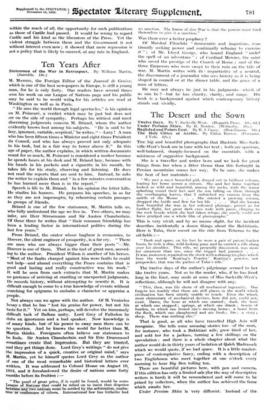Ten Years After
Statesmen of the War in Retrospect. By William Martin. (Jarrolds. 18s.) M. MARTIN, the Foreign Editor of the Journal de Geneve, which is one of the best newspapers in Europe, is still a young
man, for he is only forty. Our readers have several times seen his work on our League of Nations page and his public may be said to be world wide, for his articles are read at Washington as well as in Paris.
" He sees the world through legal spectacles," is his opinion on M. Poincare, a verdict which may be just but does not err on the side of sympathy. Perhaps his wittiest and most
discerning judgments concern M. 13riand, whom the -author evidently knows best among his subjects. " He is said to be
lazy, ignorant, variable, sceptical," he writes, " —Lazy ! A man who has been fifteen times a Minister and eight times President du Conseil, and who has always proved not only adequate to his task, but in a fair way -to tower above it." In this age of paper, the author explains, in which written documents count for so much, M. Poineare is considered a worker because he spends hours at his desk and M. Briand lazy, because with his hands in his pockets and a cigarette in his mouth, he takes life for his study, observing and listening. He does not read the reports that are sent to him. Instead, he asks the writer to explain them and " in a few minutes conversation he has learned more than is in the report."
Speech is life to M. Briand. In his opinion the letter kills. He studies his hearers. He prepares his speeches, in so far as they are not impromptu, by rehearsing certain passages to groups of friends.
Briand is one of the few statesmen, M. Martin tells us, who fully understand the age we live in. Two others, we may infer, are Herr Stre.semann and Sir Austen Chamberlain. Of these three he writes that " their common friendship has been a leading factor in international polities during the last few Years."
From Briand, the orator whose bugbear is economics, to Hoover, the silent engineer of prosperity, is a far cry. " There are men who are always bigger than their posts "—Mr. Hoover is one of them. That is the test of great men, accord- ing to the author. President Wilson is another of his heroes. "Most of the faults charged against him were faults he could not help—and almost everything the Peace contains that is good and lasting and really constructive was his work." It will be seen from such extracts that M. Martin makes no pretence of arriving at startling or unexpected judgments. He records history, without attempting to rewrite it. It is difficult enough to come to a true knowledge of events without searching for epigrams to embalm a character or appraise a people.
Not always can we agree with the author. Of M. Venizelos hesay s that he has " lost his genius for power, but not his taste for it." Yet on him, perhaps, will devolve the immensely difficult task of Balkan unity. Lord Grey of Fallodon he dubs an ignoramus and a bad speaker. Now knowledge is of many kinds, but of his power to sway men there can be no question. And he knows the world far better than M. Martin thinks. Foreigners often believe our statesmen to be fools. Sir Austen Chamberlain and Sir Eric Drummond sometimes create that impression. But they are trusted, and they get things done. Lord Grey's writings " do not give the impression of a quick, creative or original mind," says M. Martin, yet he himself quotes Lord Grey as the author Df one of the most remarkable and historical letters ever Written. It was addressed to Colonel House on August 10, 1915, and it foreshadowed the desire of nations some forty months before its fruition The pearl of great price, if it could be found, would be some League of Nations that could be relied on to insist that disputes between %.,artw-.6 reties,$ must be settled by Ihe arbitriatiOn, media- tion or conference of others, International litw has hitherto had
no sanction. The lesson of this War is that the powers must bind themselves to give it a sanction."
Was there ever a better prophecy ?
Of Marshal Pilsudski " democratic and imperious, con- tinually seeking power and continually refusing to exercise it " ; of Mr. Lloyd George, who bound England " under the spell of an adventure" ; of Cardinal Mercier, the saint who saved the prestige of the Church of Rome ; and of the three Emperors who were swept to their ruin on the tide of war, M. Martin writes with tit! impartiality of a neutral, the discernment of a journalist who sees history as it is being shaped in council or at the dinner table, and the grace of a
man of letters. •
He may not always be just in his judgments—which of us can be ?—hut he has charity; clarity, and range. Ills book is a background against which contemporary history stands out vividly.


















































 Previous page
Previous page